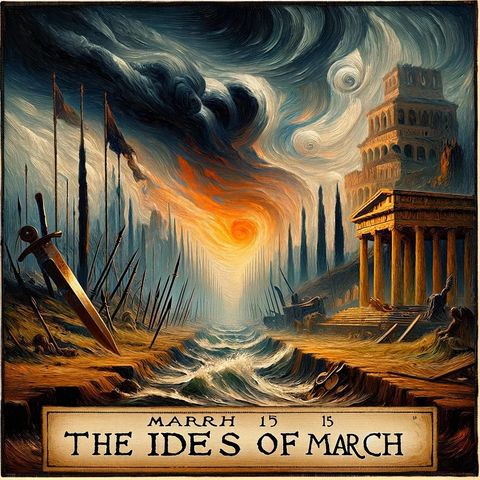
Contacts
Info
Unravel the Mystery Behind "Beware the Ides of March"Have you ever heard the phrase "Beware the Ides of March" and wondered what it means? This seemingly ominous statement has a...
show more
Unravel the Mystery Behind "Beware the Ides of March"Have you ever heard the phrase "Beware the Ides of March" and wondered what it means? This seemingly ominous statement has a rich history, rooted in the ancient Roman calendar and forever linked to a pivotal moment in Western civilization. This podcast dives deep into the origin, significance, and enduring cultural impact of the Ides of March.Beyond Shakespeare: A Historical JourneyWhile the phrase gained widespread recognition through William Shakespeare's Julius Caesar, the Ides of March predates the Bard by nearly two millennia. In the Roman calendar, it referred to the 15th day of March, March 15th on our modern calendar. This date held specific importance, marking:
Keywords: Ides of March, Julius Caesar, Roman Calendar, History, Assassination, Shakespeare, Folklore, Superstition, Legacy, Culture, Podcast
show less
- Religious Observances: Several Roman festivals and rituals were tied to the Ides, including offerings to the goddess Minerva.
- Financial Deadlines: The Ides served as a crucial deadline for settling debts and paying taxes, potentially explaining the sense of foreboding associated with the day.
- The intricacies of the Roman calendar
- The historical context surrounding Julius Caesar's assassination
- The evolution of the phrase "Beware the Ides of March"
- The cultural impact of the Ides in literature, art, and popular media
Keywords: Ides of March, Julius Caesar, Roman Calendar, History, Assassination, Shakespeare, Folklore, Superstition, Legacy, Culture, Podcast

Transcribed
5 MAR 2024 · March 15 - The Ides of March and why it is associated with Doom
Unravel the Mystery Behind "Beware the Ides of March"Have you ever heard the phrase "Beware the Ides of March" and wondered what it means? This seemingly ominous statement has a...
show more
Unravel the Mystery Behind "Beware the Ides of March"Have you ever heard the phrase "Beware the Ides of March" and wondered what it means? This seemingly ominous statement has a rich history, rooted in the ancient Roman calendar and forever linked to a pivotal moment in Western civilization. This podcast dives deep into the origin, significance, and enduring cultural impact of the Ides of March.Beyond Shakespeare: A Historical JourneyWhile the phrase gained widespread recognition through William Shakespeare's Julius Caesar, the Ides of March predates the Bard by nearly two millennia. In the Roman calendar, it referred to the 15th day of March, March 15th on our modern calendar. This date held specific importance, marking:
Keywords: Ides of March, Julius Caesar, Roman Calendar, History, Assassination, Shakespeare, Folklore, Superstition, Legacy, Culture, Podcast
show less
- Religious Observances: Several Roman festivals and rituals were tied to the Ides, including offerings to the goddess Minerva.
- Financial Deadlines: The Ides served as a crucial deadline for settling debts and paying taxes, potentially explaining the sense of foreboding associated with the day.
- The intricacies of the Roman calendar
- The historical context surrounding Julius Caesar's assassination
- The evolution of the phrase "Beware the Ides of March"
- The cultural impact of the Ides in literature, art, and popular media
Keywords: Ides of March, Julius Caesar, Roman Calendar, History, Assassination, Shakespeare, Folklore, Superstition, Legacy, Culture, Podcast
Information
| Author | QP-2 |
| Organization | William Corbin |
| Categories | History |
| Website | - |
| corboo@mac.com |
Copyright 2024 - Spreaker Inc. an iHeartMedia Company
